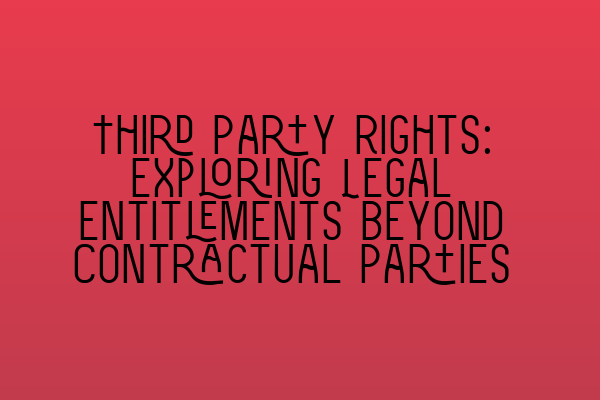Third Party Rights: Exploring Legal Entitlements beyond Contractual Parties
Welcome to SQE Contract Law! In this blog post, we will delve into the fascinating topic of third party rights and the legal entitlements that exist beyond the parties directly involved in a contract. It’s an area of law that often goes unnoticed, but one that can have significant implications and consequences.
Before we dive in, let’s define what we mean by third party rights. In contract law, third party rights refer to the rights and obligations that arise between a third party and the parties to a contract. Typically, only the parties who have entered into a contract are legally bound by its terms. However, there are certain circumstances where a third party can assert their rights and enforce the terms of a contract, or seek remedies for any breaches.
The Doctrine of Privity
Traditionally, the doctrine of privity prevented a third party from enforcing the terms of a contract. This meant that even if a third party stood to benefit from the contract or had a direct interest in its performance, they were unable to bring a claim against the contracting parties. However, the law has evolved over time, and various exceptions to the doctrine of privity now allow for third party rights to be recognized and enforced.
Exceptions to the Doctrine of Privity
One of the most common exceptions to the doctrine of privity is the “intended beneficiary” exception. This occurs when the parties to a contract clearly express their intention to confer a benefit on a third party. In such cases, the third party can enforce the contract and seek appropriate remedies if necessary. It’s important to note that the intention to confer a benefit must be clear and unambiguous for this exception to apply.
An example of the intended beneficiary exception is when a couple enters into a contract to purchase a house and includes a provision for their child to inherit the property. If the couple fails to fulfill this provision, the child, as the intended beneficiary, can bring a claim against the parents.
Another exception to the doctrine of privity is the “collateral contract” exception. This occurs when a third party enters into a separate contract with one of the original parties, and the terms of that contract are dependent on the main contract. In such cases, the third party can rely on the terms of the main contract and seek remedies if there is a breach.
Implications and Considerations
The recognition of third party rights can have significant implications for contracting parties. It’s important to carefully consider and document any intended third party rights from the outset to avoid any potential disputes or claims in the future. This includes clearly expressing the intention to confer a benefit on a third party and ensuring the terms are adequately drafted to reflect this intention.
As a solicitor, it is crucial to guide your clients through the complexities of third party rights. This involves conducting thorough due diligence, advising on the potential risks and benefits, and drafting contracts that accurately reflect the intentions of all parties involved.
Additionally, staying up to date with the latest legal developments and case law related to third party rights is essential. It ensures you can provide the most accurate and informed advice to your clients, and effectively advocate for their interests in any potential disputes.
To further enhance your knowledge and understanding, we recommend exploring the following related articles:
- Navigating Legal Challenges and Pitfalls in Your Practice
- Barrister vs. Solicitor: A Comprehensive Comparison
- Understanding the SRA Competence Statement: A Guide for Solicitors
- Exploring Different Solicitor Specializations: Finding Your Niche
- Top Recommendations for Law Schools in the UK
In conclusion, third party rights are a complex and evolving area of contract law. Understanding the exceptions to the doctrine of privity and their implications is essential for solicitors and contracting parties alike. By staying informed and providing tailored advice, solicitors can navigate the potential challenges and pitfalls associated with third party rights while protecting their clients’ interests.
